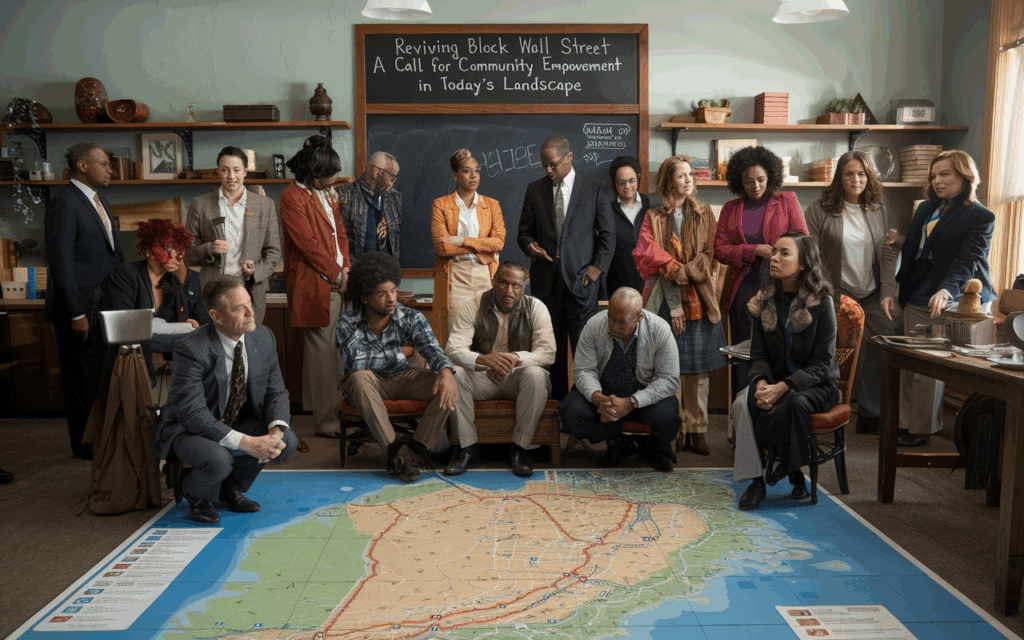Trump's Actions Spark a Call for a Black Wall Street 💼🏙️
The recent political landscape has been nothing short of turbulent, with actions from former President Donald Trump igniting complex discussions around race, segregation, and community empowerment. In this heated environment, there is a resurfacing of ambitions to create modern-day Black Wall Streets—a term historically associated with thriving African American communities that flourished before being destroyed by violence and discrimination.
A Reflection on Black Wall Street 🏿✊
For those unfamiliar, Black Wall Street refers to the Greenwood District in Tulsa, Oklahoma, known for its prosperous Black-owned businesses during the early 20th century. It was a powerful symbol of Black economic independence—until the devastating 1921 riots that obliterated this success amidst a backdrop of white supremacy. Today, aspiring for a new Black Wall Street signifies a yearning for economic autonomy and a space for Black communities to flourish without the intrusion of systemic racism.
The recent executive orders by Trump dismantling certain inclusivity measures have some questioning whether segregation might lead to community unification. TikTok creator Nathan Daye, for instance, humorously suggested on his platform that if segregation is being revived, perhaps the time has come to rethink community approaches. His ironic commentary has resonated strongly with followers, shedding light on a broader call for discussion amongst Black communities about health, business, and opportunity.
The Community's Perspective 🗣️
As voiced by Joy Williams, a TikToker advocating for economic self-sufficiency, a revived Black Wall Street could provide a golden chance for unity. This sentiment reflects a growing interest in building networks of support within Black communities to foster entrepreneurship. The call isn't merely for a repetition of past mistakes; the focus is on organized, collective efforts to thrive economically in a landscape that has historically favored white business owners.
Khalil Muhammad, a professor at Princeton University, emphasizes the difference between voluntary community efforts aimed at self-help versus mandated segregation aimed at oppression. While Williams believes in the potential for a self-sustaining community, she acknowledges the historical struggles surrounding economic empowerment for Black Americans.
Challenges and Skeptics 🚧
However, this vision of an all-Black economic Mecca raises pertinent questions. Are we merely romanticizing the idea of Black independence in the face of systemic societal barriers? Mehrsa Baradaran, a prominent scholar in economic inequality, warns against believing that simply pooling resources will suffice without addressing the structural forces at play.
Recent initiatives, like Aniya Holloway’s Kyn, a proposed cryptocurrency aimed at empowering Black entrepreneurs, highlight both innovation and the fragility of funding in Black communities. Although her project aimed at enhancing economic solidarity, it ultimately faced significant hurdles, reminding us that trust and accountability are paramount in community ventures.
The Road Ahead 🔍
As we navigate this complicated path towards economic autonomy, a blend of grassroots political activism, community support, and historical awareness is essential. Baradaran asserts that true change cannot stem solely from community endeavors; legal equity and political justice are equally vital to protect and sustain Black economic initiatives.
Amidst this complex landscape, one truth stands resilient: community solidarity is crucial. Whether it involves forming innovative economic networks or advocating for political representation, the essence lies in the collective will to thrive together.
As the conversation continues and the yearning for a new Black Wall Street rises, the question remains: Can we foster an environment where community empowerment flourishes despite historical and systemic challenges?
It’s inspiring to witness renewed interest in developing community-oriented economic frameworks. The dream of Black Wall Street signifies more than just a historical anecdote; it’s a rallying cry for a united and prosperous future for Black Americans.
👇 What are your thoughts on building economic solidarity in Black communities today? Share your insights below! 🌍💬
#BlackWallStreet #CommunityEmpowerment

More Stories
Exciting News: The Summer I Turned Pretty is Becoming a Movie
Reflecting on Robert Redford’s Legacy of Integrity and Artistry
Sara Rivers Appeals Dismissal of $60 Million Lawsuit Against Sean Combs: A Fight for Justice in the Entertainment Industry